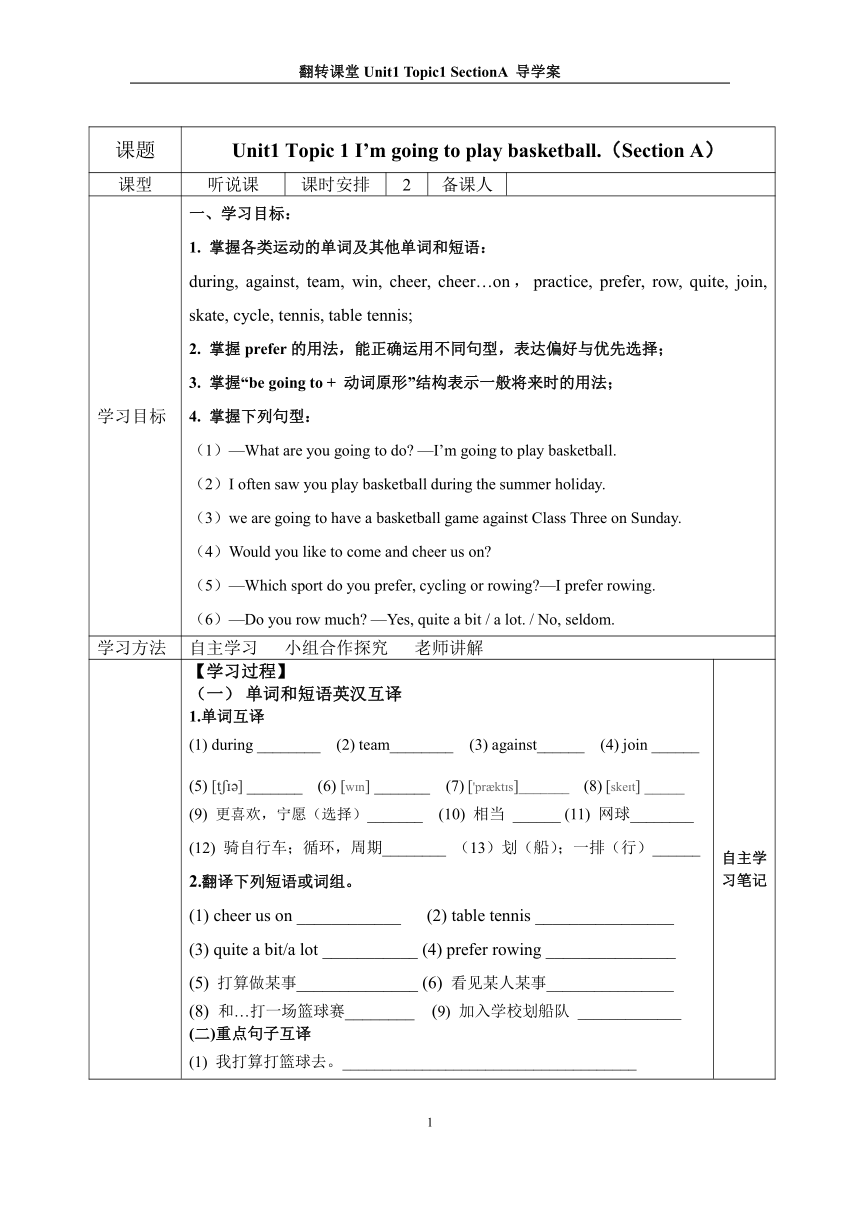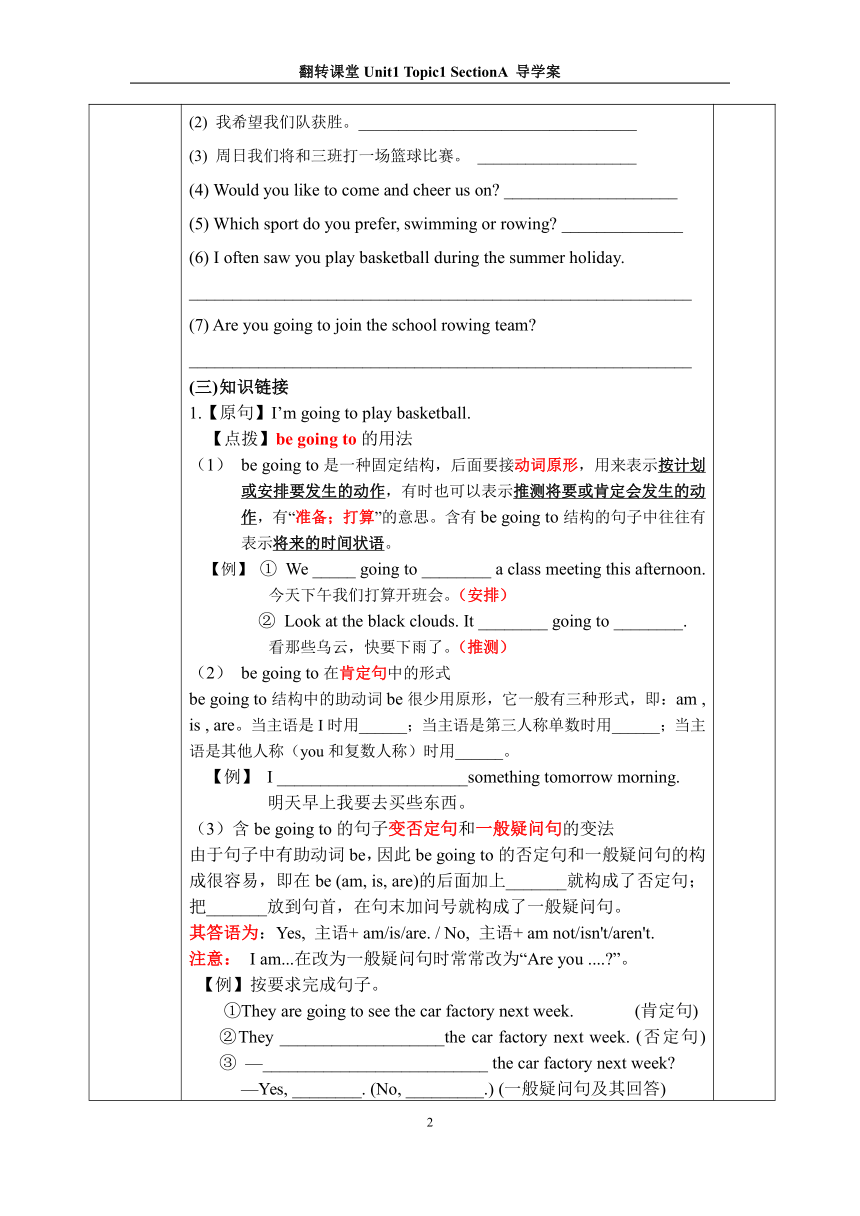仁爱八上Unit 1 Playing Sports Topic 1 SA导学案(表格式无答案)
文档属性
| 名称 | 仁爱八上Unit 1 Playing Sports Topic 1 SA导学案(表格式无答案) |

|
|
| 格式 | zip | ||
| 文件大小 | 23.8KB | ||
| 资源类型 | 教案 | ||
| 版本资源 | 仁爱科普版 | ||
| 科目 | 英语 | ||
| 更新时间 | 2022-08-22 00:00:00 | ||
图片预览


文档简介
翻转课堂Unit1 Topic1 SectionA 导学案
课题 Unit1 Topic 1 I’m going to play basketball.(Section A)
课型 听说课 课时安排 2 备课人
学习目标 一、学习目标: 1. 掌握各类运动的单词及其他单词和短语: during, against, team, win, cheer, cheer…on,practice, prefer, row, quite, join, skate, cycle, tennis, table tennis; 2. 掌握prefer的用法,能正确运用不同句型,表达偏好与优先选择; 3. 掌握“be going to + 动词原形”结构表示一般将来时的用法; 4. 掌握下列句型: (1)—What are you going to do —I’m going to play basketball. (2)I often saw you play basketball during the summer holiday. (3)we are going to have a basketball game against Class Three on Sunday. (4)Would you like to come and cheer us on (5)—Which sport do you prefer, cycling or rowing —I prefer rowing. (6)—Do you row much —Yes, quite a bit / a lot. / No, seldom.
学习方法 自主学习 小组合作探究 老师讲解
【学习过程】 单词和短语英汉互译 1.单词互译 (1) during ________ (2) team________ (3) against______ (4) join ______ (5) [t ] _______ (6) [w n] _______ (7) ['pr kt s]_______ (8) [ske t] _____ (9) 更喜欢,宁愿(选择)_______ (10) 相当 ______ (11) 网球________ (12) 骑自行车;循环,周期________ (13)划(船);一排(行)______ 2.翻译下列短语或词组。 (1) cheer us on ____________ (2) table tennis ________________ (3) quite a bit/a lot ___________ (4) prefer rowing _______________ (5) 打算做某事______________ (6) 看见某人某事________________ (8) 和…打一场篮球赛________ (9) 加入学校划船队 _____________ (二)重点句子互译 (1) 我打算打篮球去。_____________________________________ (2) 我希望我们队获胜。___________________________________ (3) 周日我们将和三班打一场篮球比赛。 ____________________ (4) Would you like to come and cheer us on ____________________ (5) Which sport do you prefer, swimming or rowing ______________ (6) I often saw you play basketball during the summer holiday. __________________________________________________________ (7) Are you going to join the school rowing team __________________________________________________________ 知识链接 1.【原句】I’m going to play basketball. 【点拨】be going to的用法 be going to是一种固定结构,后面要接动词原形,用来表示按计划或安排要发生的动作,有时也可以表示推测将要或肯定会发生的动作,有“准备;打算”的意思。含有be going to结构的句子中往往有表示将来的时间状语。 【例】 ① We _____ going to ________ a class meeting this afternoon. 今天下午我们打算开班会。(安排) ② Look at the black clouds. It ________ going to ________. 看那些乌云,快要下雨了。(推测) (2) be going to在肯定句中的形式 be going to结构中的助动词be很少用原形,它一般有三种形式,即:am , is , are。当主语是I时用______;当主语是第三人称单数时用______;当主语是其他人称(you和复数人称)时用______。 【例】 I ______________________something tomorrow morning. 明天早上我要去买些东西。 (3)含be going to的句子变否定句和一般疑问句的变法 由于句子中有助动词be,因此be going to的否定句和一般疑问句的构成很容易,即在be (am, is, are)的后面加上_______就构成了否定句;把_______放到句首,在句末加问号就构成了一般疑问句。 其答语为:Yes, 主语+ am/is/are. / No, 主语+ am not/isn't/aren't. 注意: I am...在改为一般疑问句时常常改为“Are you .... ”。 【例】按要求完成句子。 ①They are going to see the car factory next week. (肯定句) ②They ___________________the car factory next week. (否定句)③ —__________________________ the car factory next week —Yes, ________. (No, _________.) (一般疑问句及其回答) 2.【原句】I often saw you play basketball during the summer holiday. 【点拨】 ①see sb. do sth. “看见某人做某事”。表示看见某人某动作行为的经常性、习惯性发生,强调看到动作的全过程。 表示这个动作行为的动词要用原形。 【例】I see him go to school very early every Monday morning. 译:___________________________________. ②see sb. doing sth. “看见某人正在做某事”。强调动作正在进行。 【例】我看见一些男孩在操场上踢足球。 译:___________________________________. 【拓展】 see 属于感官动词,常用的感官动词还有:hear, watch, notice, feel, listen to等等,其用法与see类似。 ③ during the summer holiday “在暑假期间”。此处during表示“在……期间”,相当于in。 【例】Mary often goes swimming during/in the summer. 译:_______________________________________ 3.【原句】Would you like to come and cheer us on 【点拨】 cheer sb on (以欢呼)激励某人,为某人加油,向某人欢呼。 如果后面接名词,放在cheer on 的中间和后面都可以;如果后面接人称代词,则必须放在中间。 【例】 ① My friends cheered on their favorite singers. 译:________________________________. ② Our friends will cheer us on. 译:________________________________. 【拓展】cheer sb up 使某人振作或高兴起来, 【例】I will try to cheer him up. 译:________________________________. 4.【原句】I hope our team will win. 【回顾】hope可用于以下两种结构: ① hope to do sth “希望去做某事” 【例】我希望很快见到你。 译:____________________________. ② hope + that从句,that可省略,“希望……”。 【例】I hope (that) she will get fine.译:_______________________. 【点拨】win 赢得(比赛,战争等),可作及物动词或不及物动词。过去式为won;名词形式为 winner (胜利者) 5.【原句】I prefer rowing. 【点拨】prefer 更喜欢,相当于like…better prefer的过去式为preferred ① prefer + n. /pron. (名词/代词) 【例】—Which do you prefer, meat or fish —I prefer meat. 译:___________________________________. ② prefer + v.-ing (动名词) 【例】—Do you like swimming? 你喜欢游泳吗? —Yes, but I prefer _______. 喜欢,但我更喜欢划船。 ③ prefer + to do (不定式) 【例】I prefer ______ the weekend at home. 我更喜欢在家里度周末。 ④ prefer A to B:意为“比起B更喜欢A” 【注意】此处to是介词,A与B是平行结构,prefer和to后接名词,代词或动名词。 【例】(1)I prefer ________to ________. 比起猫我更喜欢狗。 (2)I prefer ___at home to ___ out. 比起出去我更愿待在家。 6.【原句】Are you going to join the school rowing team 【点拨】join 作“参加,加入”讲时,一般指参加某一组织、团体或某群人。 【例】 ① join the Party__________ ② join the army___________ 【拓展】join in 作“参加,加入”讲时,一般指参加某项活动。 【例】 join in a game __________ 7. 【原句】You know, we are going to have a basketball game against Class Three on Sunday. 【点拨】against 介词, 意为“反对;紧靠,倚”。 【例】① That is ____ the law. 那是违法的。 ② Put the piano there, ____the wall. 把钢琴放在那,紧靠着墙。 8. 【原句】Do you row much 【点拨】much和quite a lot/ a bit一样,常与行为动词连用,用来描述某个动作发生频率,意为“经常”;也可与表示情感的动词连用,表示情感的深浅程度,意为“非常”。 【例】—Does Lily dance much 莉莉经常跳舞吗? —Yes, quite _____ _____. 是的,经常跳。 (四)完成任务 任务一、读Section A单词和课文,并上传录音到平板; 任务二、完成课本P1的1b,1c, 1d部分; 任务三、完成课本P2的3a部分。 (五)我的疑惑:_________________________________ 自主学 习笔记
2
课题 Unit1 Topic 1 I’m going to play basketball.(Section A)
课型 听说课 课时安排 2 备课人
学习目标 一、学习目标: 1. 掌握各类运动的单词及其他单词和短语: during, against, team, win, cheer, cheer…on,practice, prefer, row, quite, join, skate, cycle, tennis, table tennis; 2. 掌握prefer的用法,能正确运用不同句型,表达偏好与优先选择; 3. 掌握“be going to + 动词原形”结构表示一般将来时的用法; 4. 掌握下列句型: (1)—What are you going to do —I’m going to play basketball. (2)I often saw you play basketball during the summer holiday. (3)we are going to have a basketball game against Class Three on Sunday. (4)Would you like to come and cheer us on (5)—Which sport do you prefer, cycling or rowing —I prefer rowing. (6)—Do you row much —Yes, quite a bit / a lot. / No, seldom.
学习方法 自主学习 小组合作探究 老师讲解
【学习过程】 单词和短语英汉互译 1.单词互译 (1) during ________ (2) team________ (3) against______ (4) join ______ (5) [t ] _______ (6) [w n] _______ (7) ['pr kt s]_______ (8) [ske t] _____ (9) 更喜欢,宁愿(选择)_______ (10) 相当 ______ (11) 网球________ (12) 骑自行车;循环,周期________ (13)划(船);一排(行)______ 2.翻译下列短语或词组。 (1) cheer us on ____________ (2) table tennis ________________ (3) quite a bit/a lot ___________ (4) prefer rowing _______________ (5) 打算做某事______________ (6) 看见某人某事________________ (8) 和…打一场篮球赛________ (9) 加入学校划船队 _____________ (二)重点句子互译 (1) 我打算打篮球去。_____________________________________ (2) 我希望我们队获胜。___________________________________ (3) 周日我们将和三班打一场篮球比赛。 ____________________ (4) Would you like to come and cheer us on ____________________ (5) Which sport do you prefer, swimming or rowing ______________ (6) I often saw you play basketball during the summer holiday. __________________________________________________________ (7) Are you going to join the school rowing team __________________________________________________________ 知识链接 1.【原句】I’m going to play basketball. 【点拨】be going to的用法 be going to是一种固定结构,后面要接动词原形,用来表示按计划或安排要发生的动作,有时也可以表示推测将要或肯定会发生的动作,有“准备;打算”的意思。含有be going to结构的句子中往往有表示将来的时间状语。 【例】 ① We _____ going to ________ a class meeting this afternoon. 今天下午我们打算开班会。(安排) ② Look at the black clouds. It ________ going to ________. 看那些乌云,快要下雨了。(推测) (2) be going to在肯定句中的形式 be going to结构中的助动词be很少用原形,它一般有三种形式,即:am , is , are。当主语是I时用______;当主语是第三人称单数时用______;当主语是其他人称(you和复数人称)时用______。 【例】 I ______________________something tomorrow morning. 明天早上我要去买些东西。 (3)含be going to的句子变否定句和一般疑问句的变法 由于句子中有助动词be,因此be going to的否定句和一般疑问句的构成很容易,即在be (am, is, are)的后面加上_______就构成了否定句;把_______放到句首,在句末加问号就构成了一般疑问句。 其答语为:Yes, 主语+ am/is/are. / No, 主语+ am not/isn't/aren't. 注意: I am...在改为一般疑问句时常常改为“Are you .... ”。 【例】按要求完成句子。 ①They are going to see the car factory next week. (肯定句) ②They ___________________the car factory next week. (否定句)③ —__________________________ the car factory next week —Yes, ________. (No, _________.) (一般疑问句及其回答) 2.【原句】I often saw you play basketball during the summer holiday. 【点拨】 ①see sb. do sth. “看见某人做某事”。表示看见某人某动作行为的经常性、习惯性发生,强调看到动作的全过程。 表示这个动作行为的动词要用原形。 【例】I see him go to school very early every Monday morning. 译:___________________________________. ②see sb. doing sth. “看见某人正在做某事”。强调动作正在进行。 【例】我看见一些男孩在操场上踢足球。 译:___________________________________. 【拓展】 see 属于感官动词,常用的感官动词还有:hear, watch, notice, feel, listen to等等,其用法与see类似。 ③ during the summer holiday “在暑假期间”。此处during表示“在……期间”,相当于in。 【例】Mary often goes swimming during/in the summer. 译:_______________________________________ 3.【原句】Would you like to come and cheer us on 【点拨】 cheer sb on (以欢呼)激励某人,为某人加油,向某人欢呼。 如果后面接名词,放在cheer on 的中间和后面都可以;如果后面接人称代词,则必须放在中间。 【例】 ① My friends cheered on their favorite singers. 译:________________________________. ② Our friends will cheer us on. 译:________________________________. 【拓展】cheer sb up 使某人振作或高兴起来, 【例】I will try to cheer him up. 译:________________________________. 4.【原句】I hope our team will win. 【回顾】hope可用于以下两种结构: ① hope to do sth “希望去做某事” 【例】我希望很快见到你。 译:____________________________. ② hope + that从句,that可省略,“希望……”。 【例】I hope (that) she will get fine.译:_______________________. 【点拨】win 赢得(比赛,战争等),可作及物动词或不及物动词。过去式为won;名词形式为 winner (胜利者) 5.【原句】I prefer rowing. 【点拨】prefer 更喜欢,相当于like…better prefer的过去式为preferred ① prefer + n. /pron. (名词/代词) 【例】—Which do you prefer, meat or fish —I prefer meat. 译:___________________________________. ② prefer + v.-ing (动名词) 【例】—Do you like swimming? 你喜欢游泳吗? —Yes, but I prefer _______. 喜欢,但我更喜欢划船。 ③ prefer + to do (不定式) 【例】I prefer ______ the weekend at home. 我更喜欢在家里度周末。 ④ prefer A to B:意为“比起B更喜欢A” 【注意】此处to是介词,A与B是平行结构,prefer和to后接名词,代词或动名词。 【例】(1)I prefer ________to ________. 比起猫我更喜欢狗。 (2)I prefer ___at home to ___ out. 比起出去我更愿待在家。 6.【原句】Are you going to join the school rowing team 【点拨】join 作“参加,加入”讲时,一般指参加某一组织、团体或某群人。 【例】 ① join the Party__________ ② join the army___________ 【拓展】join in 作“参加,加入”讲时,一般指参加某项活动。 【例】 join in a game __________ 7. 【原句】You know, we are going to have a basketball game against Class Three on Sunday. 【点拨】against 介词, 意为“反对;紧靠,倚”。 【例】① That is ____ the law. 那是违法的。 ② Put the piano there, ____the wall. 把钢琴放在那,紧靠着墙。 8. 【原句】Do you row much 【点拨】much和quite a lot/ a bit一样,常与行为动词连用,用来描述某个动作发生频率,意为“经常”;也可与表示情感的动词连用,表示情感的深浅程度,意为“非常”。 【例】—Does Lily dance much 莉莉经常跳舞吗? —Yes, quite _____ _____. 是的,经常跳。 (四)完成任务 任务一、读Section A单词和课文,并上传录音到平板; 任务二、完成课本P1的1b,1c, 1d部分; 任务三、完成课本P2的3a部分。 (五)我的疑惑:_________________________________ 自主学 习笔记
2
同课章节目录
- Unit 1 Playing Sports
- Topic 1 I'm going to play basketball.
- Topic 2 I'll kick you the ball again.
- Topic 3 The school sports meet is coming.
- Unit 2 Keeping Healthy
- Topic 1 You should brush your teeth twice a day.
- Topic 2 I must ask him to give up smoking.
- Topic 3 Must we exercise to prevent the flu?
- Unit 3 Our Hobbies
- Topic 1 What's your hobby?
- Topic 2 What sweet music!
- Topic 3 What were you doing at this time yesterday
- Unit 4 Our World
- Topic 1 What's the strongest animal on the farm?
- Topic 2 How can we protect ourselves from the eart
- Topic 3 The Internet makes the world smaller.
